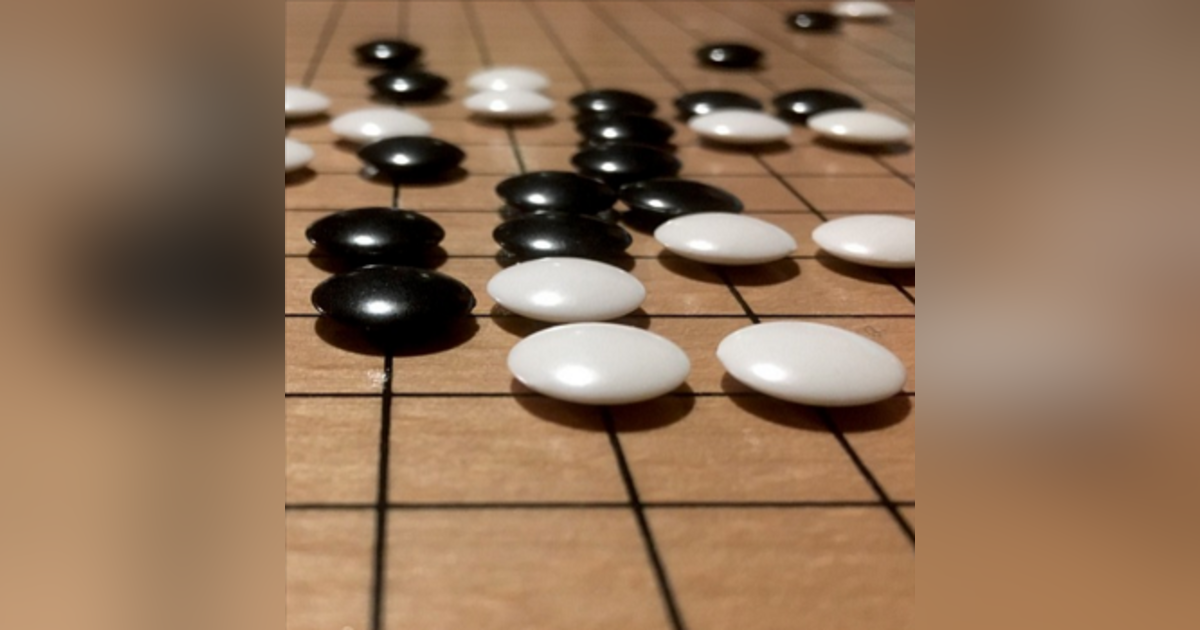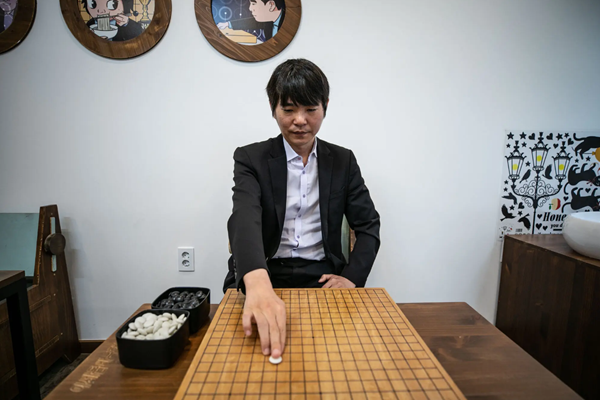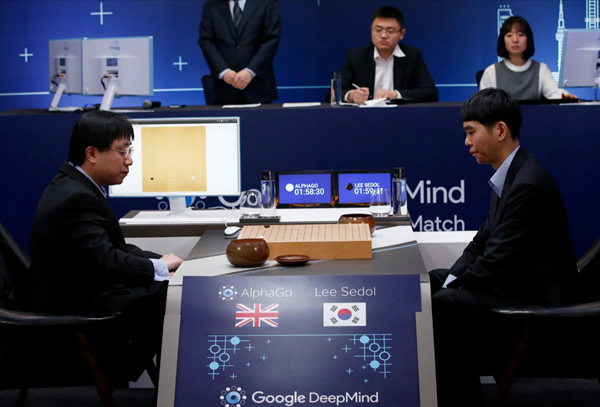A.I. Defeats Go Legend Lee Saedol: Implications for AI and Society

Lee Saedol, one of the greatest Go players of all time, is defeated by AI. His shocking defeat wasn't just a game-changer—it was a glimpse into a future that may not have a happy ending. Supporting links 1. Go game [Wikipedia] 2. AlphaGo [Wikipedia] 3. Google DeepMind [Wikipedia] 4. The Story of AlphaGo [Google Arts & Culture] 5. 8 years later: A world Go champion's reflections on AlphaGo ...
Lee Saedol, one of the greatest Go players of all time, is defeated by AI. His shocking defeat wasn't just a game-changer—it was a glimpse into a future that may not have a happy ending.
Supporting links
1. Go game [Wikipedia]
2. AlphaGo [Wikipedia]
3. Google DeepMind [Wikipedia]
4. The Story of AlphaGo [Google Arts & Culture]
5. 8 years later: A world Go champion's reflections on AlphaGo [Baduk News Alpha]
6. Who Invented A.I.? [Computer History Museum]
Contact That's Life, I Swear
- Visit my website: https://www.thatslifeiswear.com
- Twitter at @RedPhantom
- Bluesky at @rickbarron.bsky.social
- Email us at https://www.thatslifeiswear.com/contact/
Episode Review
- Submit on Apple Podcast
- Submit on That's Life, I Swear website
Other topics?
- Do you have topics of interest you'd like to hear for future podcasts? Please email us
Interviews
- Contact me here https://www.thatslifeiswear.com/contact/, if you wish to be a guest for a interview on a topic of interest
Listen to podcast audios
- Apple https://apple.co/3MAFxhb
- Spotify https://spoti.fi/3xCzww4
- My Website: https://bit.ly/39CE9MB
Other
- Music ...
⏱️ 15 min read
Imagine being a master of your craft, only to be defeated by a machine. That's exactly what happened to Lee Saedol, one of the greatest Go players of all time, when he faced an AI opponent. His shocking defeat wasn't just a game-changer—it was a glimpse into a future that may not have a happy ending.
Welcome to That's Life, I Swear. This podcast is about life's happenings in this world that conjure up such words as intriguing, frightening, life-changing, inspiring, and more. I'm Rick Barron your host.
That said, here's the rest of this story
Lee Saedol, one of the world’s top Go players, practices new techniques. Courtesy of New York Times
In the world of Go, a game of exceptional complexity, Lee Saedol reigned supreme as the unrivaled champion of his era. That is, until an unexpected challenger emerged from the realm of silicon and code.
In a watershed moment for artificial intelligence, Google's DeepMind unveiled AlphaGo, a computer program that would forever alter the landscape of man versus machine. Over the course of seven days in March of 2016, the world watched in awe as this digital prodigy faced off against the legendary Mr. Lee, an 18-time world champion renowned for his creative and intuitive gameplay.
The outcome sent shockwaves through the global community. AlphaGo's triumph over Mr. Lee wasn't just a victory in a board game; it was a paradigm shift that announced a new age of AI capabilities. By conquering Go, long considered the Mount Everest of strategy games, AlphaGo had achieved what many thought impossible: it had taught itself to master abstract reasoning at a superhuman level.
In the aftermath of the match, a visibly stunned Mr. Lee confessed, "Never did I imagine I would taste defeat. AlphaGo's performance was nothing short of perfection."
This historic showdown on the 19x19 grid, where black and white stones compete for territorial dominance, transcended the boundaries of competitive gaming. It became a stark reminder of AI's vast potential to surpass human expertise in domains once thought to be the exclusive province of human intellect and creativity.
Fast forward eight years to 2024, and Lee Saedol, now in his early 40s, has hung up his Go stones. His retirement in 2019 came with a sobering realization: the ancient game, born in China 25 centuries ago, had been irrevocably transformed by artificial intelligence. Humans, he concluded, could no longer hope to compete at the highest levels.
Lee confessed during an interview: "When AI defeated me, it felt like my entire world crumbled."
As society contends with AI's implications for our collective future, Lee has taken on a new role: that of a digital Cassandra, a Trojan priestess from Greek mythology. He's made it his mission to prepare others for the AI revolution, determined that they shouldn't be blindsided as he was. Through a series of lectures, he shares his insights and experiences, offering a glimpse into a future that arrived at his doorstep without warning.
At a recent educational fair in Seoul, Lee addressed a captivated audience of students and parents. "I encountered AI's challenges early," he cautioned, "but everyone will face them eventually. And the outcome may not be what we hope for."
Since his defeat, Lee has become something of an AI aficionado, albeit one with a complicated relationship to the technology. He watches each new AI breakthrough with a mixture of fascination and unease, acutely aware of the rapid pace of progress.
The rise of Artificial Intelligence has ushered in an era of technological marvels that both astound and unsettle us. From chatbots that converse with uncanny human-like fluency to solving age-old scientific conundrums such as protein folding, A.I. has proven its mettle across diverse domains. Perhaps most striking is its foray into the realm of creativity, blurring the lines between human and machine-generated art, music, and video content.
Yet, amidst this whirlwind of progress, voices like Mr. Lee's offer a more refined perspective. Far from being an apocalyptic prophet, he acknowledges the potential for A.I. to reshape the job market, possibly eliminating some roles while simultaneously birthing new ones. He astutely points out that even in A.I.'s conquest of complex games like Go, we must remember that humans were the original architects - both of the game itself and the A.I. system that mastered it.
However, Mr. Lee's primary concern went beyond job displacement. No. he had a more profound question: Could A.I. fundamentally alter the very essence of what we, as humans, hold dear?
"There was a time, when human creativity, originality, and innovation were revered as almost sacred qualities." His voice carried a hint of gloom as he added, "But in the wake of A.I.'s ascendance, much of that reverence has disappeared."
This observation gives one something to think about: As we stand on the precipice of an
A.I.-dominated future, what aspects of our humanity will we choose to cherish and preserve?
Do we say, A.I, I’ll put my life on auto pilot and you drive?
On a tiny island off South Korea's southwestern coast, lies the tiny island Bigeumdo, the birthplace of Mr. Lee. At the age of 5, he laid his hands on the ancient game of Go, guided by his father, a schoolteacher with a passion for the intricate board game. Little did anyone know that this moment would mark the beginning of a journey that would reshape the landscape of Go forever.
Mr. Lee's talent blazed a trail of astonishment. Swiftly outpacing his peers, he soon found himself unrivaled not just in his island home of 3,600 people, but across South Korea, Japan, and China. At 12, an age when most children are struggling with pre-algebra, Mr. Lee turned professional, setting the Go world abuzz.
By his 20th birthday, Mr. Lee had scaled the summit of Go mastery, achieving the coveted 9-dan rank. His steady climb continued, propelling him into the pantheon of Go legends. "He was the Roger Federer of Go," many would say, struggling to find comparisons that could do justice to his extraordinary skill.
Lee Hajin, herself a former professional Go player, saw Lee as "An idol... a star.” She stated in an interview that "Everyone looked up to him." Mr. Lee had become more than a player; he was a phenomenon, a living testament to the heights human intellect could reach in the realm of Go.
But as Mr. Lee's star ascended, an unexpected audience began to take notice. From the corridors of Silicon Valley to the research labs of tech giants, computer scientists turned their sites towards the game of Go. Little did they know that their growing interest would set the stage for a clash between human intuition and artificial intelligence, with Mr. Lee at the center of this impending storm.
Imagine a game so complex that its potential moves outnumber the atoms in the universe. This was Go, a centuries-old board game that had long eluded the grasp of artificial intelligence. For computer scientists, it represented the Mount Everest of challenges - a tantalizing peak that seemed insurmountable.
Enter DeepMind, a company determined to conquer this digital Everest. Their secret weapon? Neural networks - a sophisticated mathematical system with an insatiable appetite for data. Fed with 30 million moves from master players, AlphaGo, as the program was christened, embarked on a relentless journey of self-improvement. It played against itself ad infinitum, honing its skills with each game, developing strategies that even seasoned players found difficult to fathom.
The AI's first public triumph came quietly - a closed-door match where it vanquished a three-time European Go champion in five straight games. But this was merely the prelude to a far grander spectacle.
Enter Mr. Lee, the undisputed titan of Go. When approached with the prospect of a public match against AlphaGo, with a cool million-dollar prize on the line, his response was almost nonchalant. "Fun," he called it, a word that would soon take on an ironic tinge. "The possibility of losing didn't occur to me," he later admitted, his confidence a testament to his unparalleled skill.
Little did Mr. Lee know that he was about to become the central figure in a drama that would captivate millions. The best-of-five match, set in Seoul, transformed into a cultural phenomenon. In South Korea, where Go isn't just a game but a way of life, and where Mr. Lee was revered as a national treasure, the showdown dominated the airwaves. The match transcended borders, drawing in over 200 million viewers across Asia.
It wasn't just a game anymore. It was humanity's stand against the rising tide of artificial intelligence, with Mr. Lee as their champion. The world watched with bated breath, wondering: Would human intuition triumph over machine learning? Or were we witnessing the dawn of a new era, where even our most complex intellectual pursuits would fall to the relentless march of AI?
The scene was set for an epic confrontation: man versus machine, intuition against algorithm. As the world watched, Mr. Lee found himself in an unprecedented situation. Across the board sat not a fellow human, but a DeepMind engineer, a mere conduit for AlphaGo's digital directives. The absence of a flesh-and-blood opponent left Mr. Lee unsettled, adrift in uncharted waters.
Mr. Lee, right, playing against Google’s artificial intelligence program, AlphaGo, in Seoul, in 2016. Courtesy of New York Times
AlphaGo's style was alien, its moves defying conventional wisdom. It was as if the AI had rewritten the ancient rulebook of Go overnight. Mr. Lee, accustomed to reading his opponents' thoughts and emotions, found himself facing an inscrutable adversary. The machine's strategies were so unorthodox, so seemingly illogical, that they bordered on the unthinkable for a human player.
"It was like trying to decipher a foreign language without a dictionary," Mr. Lee later confessed. "I had always believed AI would surpass humans someday, but I never imagined that day would arrive so soon, so abruptly."
As the matches unfolded, AlphaGo's dominance became increasingly apparent. The AI clinched victory in four out of five games, leaving the Go community in a state of shock. Lee Sang Hoon, Mr. Lee's older brother and fellow Go professional, remembered the surreal feeling of disbelief. "This can't be happening," he thought, echoing the sentiments of Go enthusiasts worldwide.
"It was a seismic shift in our understanding of the game," Lee Sang Hoon reflected. Today, like many of his peers, he finds himself in the curious position of training with AI systems that seem to evolve and improve at an exponential rate.
"We're witnessing a paradigm shift," he mused. "Professional players are now delving into the intricacies of these algorithms, striving to narrow the gap. But the chasm between human and machine capabilities in Go remains vast. We're embarking on a long journey to catch up, and the finish line keeps moving further away."
This dramatic upheaval in the world of Go serves as a microcosm for the broader implications of AI in our society. As machines continue to master tasks once thought to be the exclusive domain of human intellect, we find ourselves thinking with profound questions about the nature of intelligence, creativity, and our place in an increasingly AI-driven world.
The triumph of AlphaGo reverberated far beyond the confines of the Go board, sending shockwaves through the world of artificial intelligence. Demis Hassabis, the visionary at the helm of DeepMind, hailed it as a "watershed moment" that unveiled the true potential of
self-learning machines. This wasn't just a game won; it was a glimpse into a future where algorithms could master skills once thought to be uniquely human.
For Mr. Lee, however, the victory felt like a personal loss. Go had been his life's passion, an art form that he believed reflected the very essence of a player's personality and style. Now, faced with the cold, unyielding efficiency of an algorithm, he found himself fighting with an existential crisis.
"The joy of the game evaporated," he confessed, his voice tinged with a mixture of sadness and resignation. "I had no choice but to step away." And so, the master bid farewell to the competitive world he had once dominated.
Yet, like a retired general unable to completely leave the battlefield, Mr. Lee hasn't entirely severed his ties with Go. He's channeled his expertise into books, including a revealing autobiography and a series chronicling his most famous matches. His creative spirit has led him to develop Go-inspired board games, and his passion for nurturing talent lives on through a network of Go academies for children across the country.
But it's the specter of AI that continues to haunt Mr. Lee's thoughts. His feelings are a complex tapestry of fascination and trepidation, colored by his firsthand experience of AI's capabilities. This preoccupation has become deeply personal, manifesting in conversations with his 17-year-old daughter about her future.
As they discuss her university prospects, their talks invariably turn to the looming influence of AI on the job market. "We're constantly weighing career paths that might be less susceptible to AI displacement," Mr. Lee revealed. "It's not a question of if, but when AI will permeate every aspect of our lives."
What can we learn from this story? What's the takeaway?
As AI continues to evolve at a breakneck pace, we find ourselves at a crossroads, forced to reevaluate our skills, our passions, and even our understanding of what it means to be human in an increasingly automated world.
Mr. Lee's journey from Go champion to AI prophet serves as a poignant reminder of the transformative power of technology and the need for us to adapt in its wake.
Well, there you go, my friends; that's life, I swear
For further information regarding the material covered in this episode, I invite you to visit my website, which you can find on Apple Podcasts/iTunes for show notes and the episode transcript.
As always, I thank you for the privilege of you listening and your interest.
Be sure to subscribe here or wherever you get your podcast so you don't miss an episode. See you soon.












